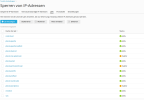Jürgen_T
Regular Pleskian
- Server operating system version
- Ubuntu 22.04.4 LTS
- Plesk version and microupdate number
- Plesk Obsidian v18.0.63_build1800240802.12 os_Ubuntu 22.04
Since the update to Plesk 18.0.63 trying to open from the Plesk UI via tools/fail2ban results in an error:
f2bmng failed: ERROR:__main__:No section: 'plesk-one-week-ban'

Trying the solution from https://support.plesk.com/hc/en-us/...-Jails-in-Fail2Ban-f2bmng-failed-ERROR-f2bmng
did not help.
f2bmng failed: ERROR:__main__:No section: 'plesk-one-week-ban'

Trying the solution from https://support.plesk.com/hc/en-us/...-Jails-in-Fail2Ban-f2bmng-failed-ERROR-f2bmng
did not help.


